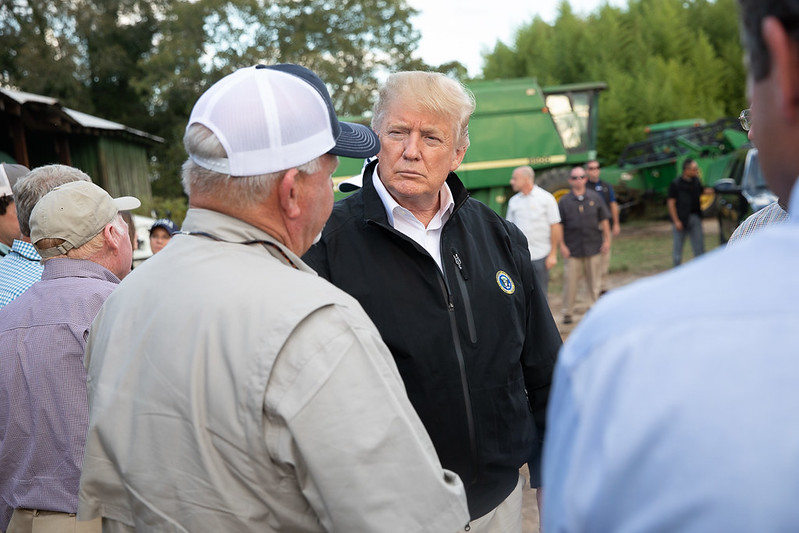Nearly half a year into Donald Trump’s second term in office, America’s farmers are justified in being frustrated with the president’s policies. Tariffs and an HHS chief that seeks to meddle in the affairs of the Agriculture Department threaten the bottom line of an otherwise efficient farm system. Consumers pay the price, with a 3 percent increase in food prices this year.
When Robert Kennedy Jr. stood outside of the USDA headquarters seven months ago, he said, “When Donald Trump gets me inside the building I’m standing outside right now, it won’t be this way anymore. American agriculture will come roaring back, and so will American health.” He promised to get corporate interests out of the agency and “the chemicals” out of American food.
Ever since he was confirmed as the secretary of Health and Human Services, RFK Jr. has managed his agency and aspired to manage the USDA. He presses for food stamp reforms that exclude the purchasing of soda, and wants drastic regulatory changes to processed foods and the use of seed oils. Both items traditionally fall under the purview of USDA, not HHS. USDA Secretary Brooke Collins has resisted some of the meddling, but the real effect of RFK is higher levels of consumer suspicion about the whole system.
According to a recent Ipsos poll, a majority of Americans believe that the government should “do more to make food safe.” Two in three Americans believe that food produced with the help of pesticides or containing artificial dyes isn’t safe to eat, even if it has been approved by the FDA. Most strikingly, more Republicans (71 percent) than Democrats (66 percent) think this way.
RFK confidently delivered mischaracterizations of nutritional and agricultural science have done the impossible in uniting Whole Foods hippies and MAGA-Republicans in the belief that big business is poisoning America for profit. Of course, only the government can save us, they say.
Too few Americans today have any association with farming to understand it.
Most people probably understand that weeds compete with crops for sunlight, water and nutrients, but do they know that weeds also transmit fungal pathogens that threaten harvests? Or that without synthetic chemistry, crop yields would drop and food prices would rise? RFK keeps Americans fixated on food dyes that have passed safety tests for decades, while the real challenges of government are in keeping food affordable and maintaining resilient supply chains.
What RFK has done to the adherence to the scientific method, Howard Lutnik has done to economics. The Secretary of Commerce defends the administration’s tariff policy, sparring most recently with Rep. Madeleine Dean in a House hearing over the price of bananas. When confronted with an 8 percent rise in the cost of bananas, downstream from the generalized 10 percent tariff on all imports from abroad, Lutnik responded, “If you build in America, and you produce your products in America, there will be no tariff.”
The U.S. produces 9 million pounds of bananas a year, most of which are grown in Hawaii and Florida. However, compared to the demand — 6.4 billion pounds annually — it is completely inconceivable for the U.S. to cover its own demand. A tariff on bananas is purely punitive for consumers and is designed to pad the Treasury’s coffers.
Consumers aren’t just paying more at checkout; farmers are being hit hard by import taxes on essential inputs. That includes fertilizer from Canada, farm machinery, and the financial pressure caused by rising domestic supply costs.
Retaliatory tariffs from other countries have also weakened demand for American exports. There is no upside for American farmers and ranchers. More than half of them oppose tariffs altogether. Yet, despite their overwhelming support for Trump in the 2024 election, the concerns of farm groups still struggle to gain traction in Washington.
The administration will deflect by pointing to an expected increase in farm revenues for 2025, but that stems almost entirely from a 357 percent increase in direct government farm payments that Republicans passed, which will increase them from $9.3 billion to $42.4 billion. In essence, farmers are expected to accept the money and remain silent. From an administration that campaigned so heavily against the rise of socialism, one wonders if effectively making farmers agents of the state would be considered one of those anti-socialist measures.
The government is peddling snake oil. Any reasonable observer can see that this level of farm subsidization is unsustainable. When the direct payments inevitably stop, farmers will be caught in a regulatory trap — one RFK Jr. seems intent on designing — without access to the open markets or imported equipment they need to stay afloat. It’s a slow-motion disaster in the making. No one seems to be suggesting we steer away from it.


